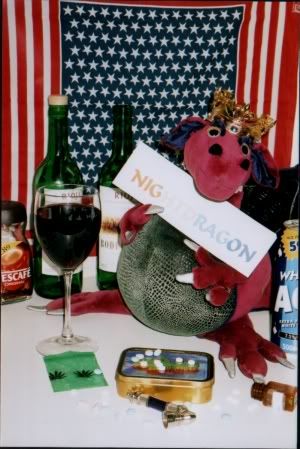
Were they smoking dope when they wrote this?
August 03, 2003 ~ 11:02 p.m.
BOSTON, MA, U.S.A.�I have in my closet here at home a copy of The New Columbia Encyclopedia. Earlier today, curious to see what it had to say about marijuana, I found the following definition and history that this encyclopedia offered.
After going into the history of cannabis cultivation in China, where it was known for its euphoric effects as early as 2737 B.C., its travels to India, North Africa, Europe and, eventually, North America, where it became an important colonial crop and grown extensively during World War II for production of hemp rope (when Asian sources of hemp were cut off), the editors touch upon its social history, which makes for very engaging reading. All words and phrases in bold are my own emphasis:
�It was probably introduced as an intoxicant into the United States in the early 20th cent. by Mexican laborers and Latin American seamen. In the United States, where it is usually smoked, it is also called weed, grass, stuff, pot, or tea. The plant grows as a common weed in many parts of the world, and drug preparations vary widely in potency according to climate, cultivation, and method of preparation. The resin found on flower clusters and top leaves of the female plant is the most potent drug source and is used to prepare hashish, the highest grade of marijuana. The primary active component is tetrahydrocannabinol, although other cannabinol derivatives are also thought to be intoxicating. Marijuana is chemically and pharmacologically unlike other hallucinogens, or psychotomimetic drugs, such as lysergic acid diethylamide, mescaline, and psilocybin. Although it produces some of the same effects, such as heightened sensitivity to colors, shapes, music, and other stimuli and distortion of the sense of time, it is much less potent, does not alter perception as drastically, and does not lead to increasing tolerance of drug dosage. A campaign conducted in the 1930s by the U.S. Federal Bureau of Narcotics (now the Bureau of Narcotics and Dangerous Drugs) sought to portray marijuana as a powerful, addicting substance that would lead users into narcotics addiction, but current evidence indicates that these assertions are untrue. Much of the prevailing public apprehension about marijuana may stem from the drug�s effect of inducing introspection and bodily passivity, which are antipathetic to a culture that values aggressiveness, achievement, and activity. Although the possibility that marijuana, like other perception-altering drugs produces psychosis has not been entirely disproved, the drug is probably most dangerous to persons with already existing psychotic tendencies; most evidence indicates that marijuana does not induce mental or physical deterioration. The drug has been used experimentally to help withdraw addicts from narcotics. With the increase in the number of middle class users, there has been a growing acceptance of the view that marijuana should not be considered in the same class as narcotics and that U.S. marijuana laws should be relaxed. Opponents arguing against easing marijuana laws assert that it is an intoxicant less controllable than alcohol, that our drug-using society does not need another widely used intoxicant, and that the United States should not act to weaken United Nations policies, which are opposed to the use of marijuana.�
This encyclopedia�s analysis comes off looking pretty tame in its definitive attitude towards cannabis�as it mentions that it is not addictive, encourages passivity over aggression, was used to help patients undergoing opium withdrawal. Most importantly, the editors trumped America�s 1930s �Reefer Madness� movement.
And, ladies and gentlemen, here�s the kicker: this edition of the encyclopedia in my closet was published in 1972! That tells me that powerful reasoning to legalize the drug have existed for decades up to this point�yet the incredible paranoia regarding marijuana continues. Politicians cannot be seen to favor the acceptance of the drug into society because of the risk of scandal. Even the current drug czar in Great Britain admitted to smoking cannabis but added that she did not like it, and this admission made the front pages.
The encyclopedia�s definition gladdened and saddened me at the same time. If such a thoughtful definition of marijuana could be written and published in an objective tome such as an encyclopedia as early as 1972, then surely thirty-one years later one would reasonably expect the drug to stand a chance at legalization. Instead, it seems as if it�ll take another thirty-one years before the American government does the smart�and right�thing and stop buying into the opponents� arguments. Less controllable than alcohol? That�s a laugh. And Canada, The Netherlands and Switzerland don�t seem to care about weakening United Nations drug policies, should why should we? If these liberal nations can extend their fingers at U.N. drug policy, surely a more conservative nation such as the U.S. can do so as well.
When will this Prohibition end? When will we be given freedom of choice and drug laws that make even an iota of sense?
� M.E.M.
|
[Sign My Guestbook]
[View My Guestbook]
|
Copyright � 2001-2007 by M.E. Manning. All material is written by me, unless explicitly stated otherwise by use of footnotes or bylines. Do not copy or redistribute without my permission.
AMERICA FOR TRUE AMERICANS!